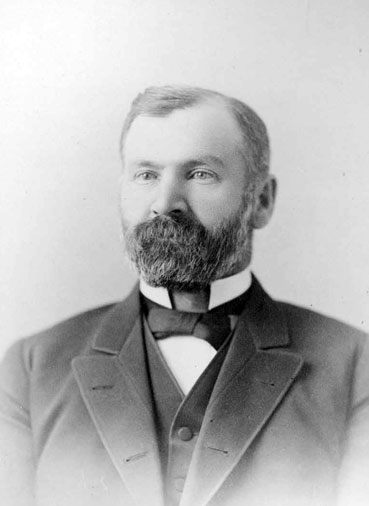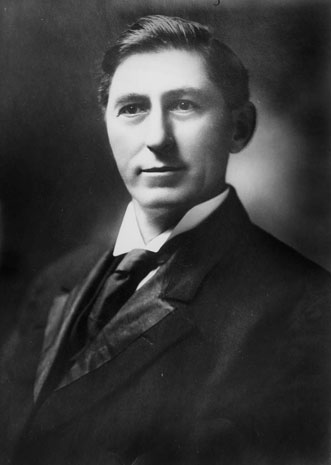We’ve launched a new web portal! Visit findhistory.nd.gov to search our collections.
Due to a road closure, the Killdeer Mountain Battlefield State Historic Site is temporarily closed.
On November 2, 1889, President Benjamin Harrison approved the admission of North Dakota to the Union. The new state was a Republican Party stronghold. The first Governor, John Miller, presided over a turbulent initial legislative session that, among other issues, fought about the question of legalizing lotteries and prohibition.

Political life revealed an insurgent tendency that has continued to the present day. In 1890, the cooperative Farmers Alliance formed an Independent Party to challenge the "McKenzie Gang" that dominated the Republican Party. The Independents fused with the minority Democratic Party in 1892 and captured state government with a platform promising significant reforms. Their efforts, however, were frustrated by political inexperience, and in 1894 the Republican Party regained power. Controlled by conservatives, North Dakota government encouraged investment by establishing liberal banking, regulatory, and taxation policies; to support their policies, conservatives argued that capitalists would not invest in North Dakota unless state government did its part to diminish risk and enhance profits.
Though severely criticized by progressives, the strategy did result in some industrial development. Large lignite mines opened near Beulah and Wilton, and local brickworks and flour mills soon dotted the state. The railroad industry, bolstered by completion of both James J. Hill's Great Northern Railway in 1887 and the Soo Line in 1893, built branch lines and fostered new towns. Rail expansion peaked in 1905 when the GN and Soo squared off in a "railway war" in northern North Dakota.
Evidence of development, however, did not quiet the progressive opposition. In their opinion, the state provided too many incentives, and they pointed out that huge profits were being taken from North Dakota, that the distant leadership of rail and commodities companies was often arrogant and unresponsive to the needs of their customers, and that rural people were often taxed out of proportion to their means. Most galling, however, was the frequent evidence that out-of-state corporate interests dominated North Dakota government, using it to further private goals rather than the general welfare of the citizens.

By 1905, the swelling chorus of protest caused a political upheaval. Republican progressives united with Democrats to elect John Burke as Governor, and his election commenced a reform era. In the next decade, a series of other movements surfaced. For example, in 1907, a new cooperative movement, the American Society of Equity, came to North Dakota and by 1913 had procreated well over 400 marketing and purchasing locals throughout the state. Among the many new settlers who immigrated during the second Dakota "boom" after 1905 were radicals, and they united into the North Dakota Socialist Party. Both the cooperative and radical movements questioned the preference given to out-of-state corporations, called for fair taxation, and demanded better services from state government. For these movements, the goal was returning control of North Dakota's government and economy to the people, and they were not afraid to demand that state government organize and operate banking, insurances, and processing businesses in order to bring the benefits of competition, lower costs, and better services to the people.
Address:
612 East Boulevard Ave.
Bismarck, North Dakota 58505
Get Directions
Hours:
State Museum and Store: 8 a.m. - 5 p.m. M-F; Sat. & Sun. 10 a.m. - 5 p.m.
We are closed New Year's Day, Easter, Thanksgiving Day, and Christmas Day. We are closed at noon Christmas Eve if it falls on Mon.-Thurs. and are closed all day if it falls on Fri.-Sun.
State Archives: 8 a.m. - 4:30 p.m. M-F, except state holidays; 2nd Sat. of each month, 10 a.m. - 4:30 p.m. Appointments are recommended. To schedule an appointment, please contact us at 701.328.2091 or archives@nd.gov.
State Historical Society offices: 8 a.m. - 5 p.m. M-F, except state holidays.
Contact Us:
phone: 701.328.2666
email: history@nd.gov
Social Media:
See all social media accounts